Examining Ethics, Third Party Obstacles, and US Immigration Policies
VerifiedAdded on 2023/06/11
|6
|1540
|339
Essay
AI Summary
This essay delves into three critical aspects of US politics. First, it examines the ethics violation case of Congressman Charles B. Rangel, discussing the charges, verdict, and impact on public trust. Second, it analyzes the reasons behind the consistent failure of third-party candidates in presidential elections, highlighting the lack of credibility, resources and ballot access challenges. Finally, the essay addresses the current issue of immigration in the United States, outlining the respective roles of federal and state authorities and the constitutional constraints governing their responses. The essay concludes by emphasizing the importance of ethical leadership and the complexities of navigating immigration policies within the framework of the US Constitution. Desklib provides a platform for students to access this essay and many other solved assignments for academic assistance.
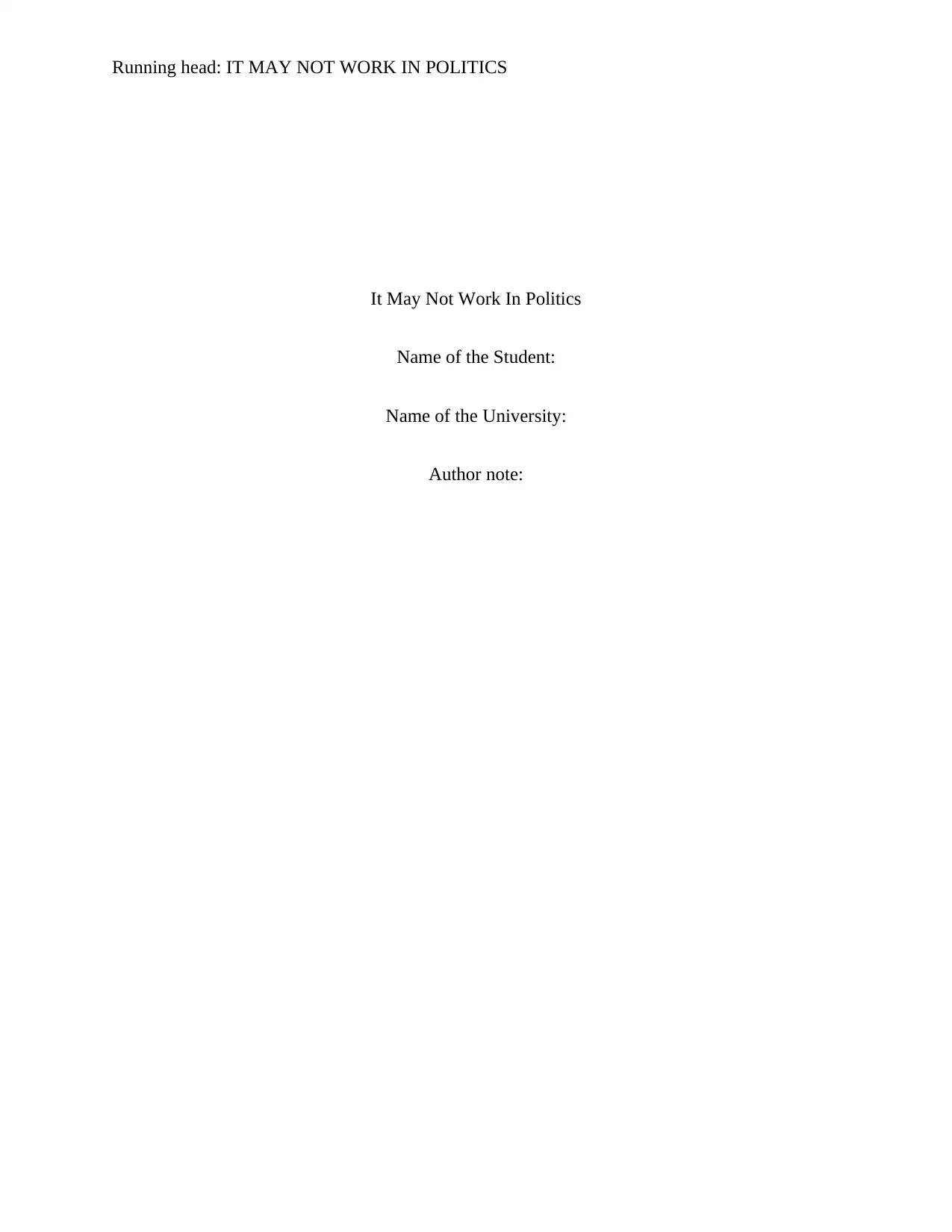
Running head: IT MAY NOT WORK IN POLITICS
It May Not Work In Politics
Name of the Student:
Name of the University:
Author note:
It May Not Work In Politics
Name of the Student:
Name of the University:
Author note:
Paraphrase This Document
Need a fresh take? Get an instant paraphrase of this document with our AI Paraphraser
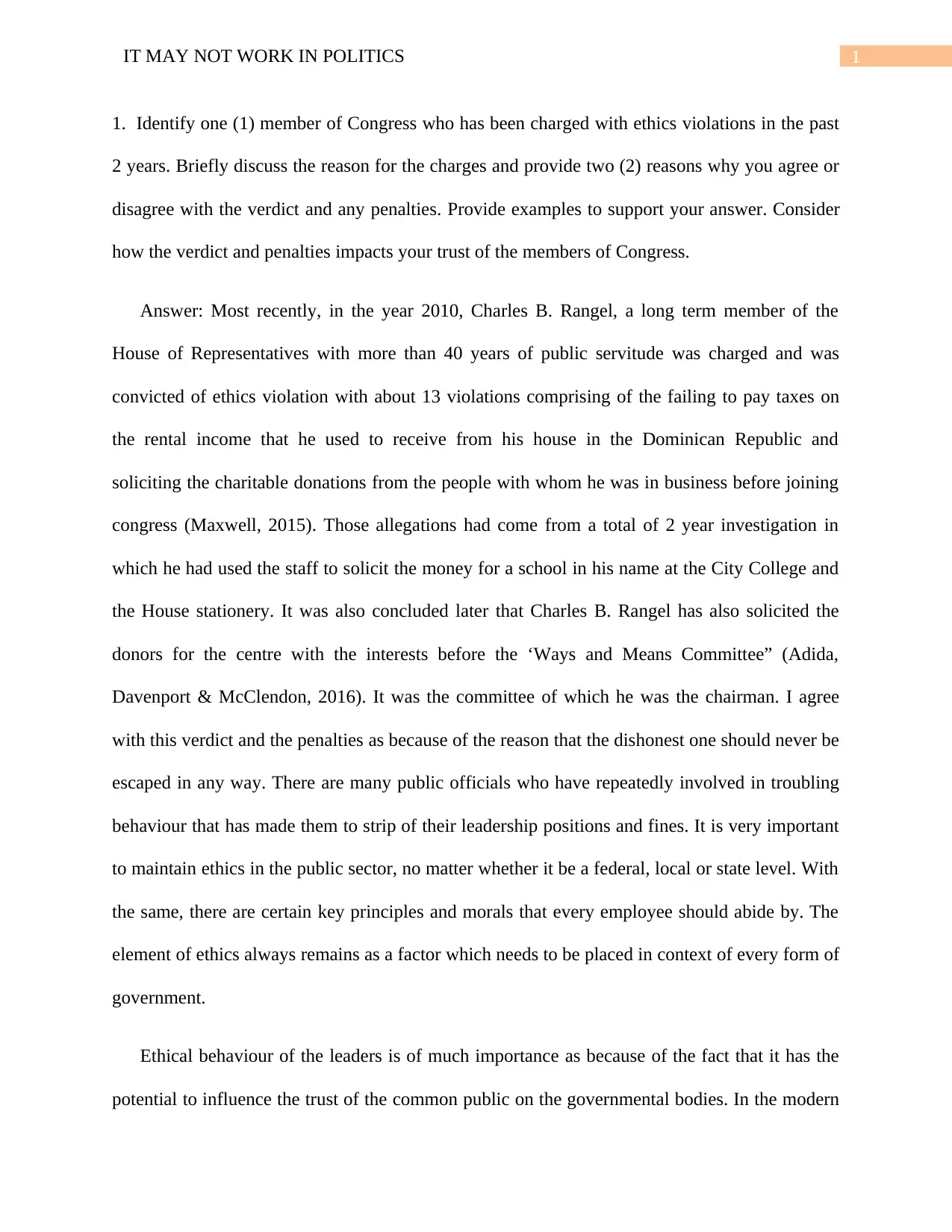
1IT MAY NOT WORK IN POLITICS
1. Identify one (1) member of Congress who has been charged with ethics violations in the past
2 years. Briefly discuss the reason for the charges and provide two (2) reasons why you agree or
disagree with the verdict and any penalties. Provide examples to support your answer. Consider
how the verdict and penalties impacts your trust of the members of Congress.
Answer: Most recently, in the year 2010, Charles B. Rangel, a long term member of the
House of Representatives with more than 40 years of public servitude was charged and was
convicted of ethics violation with about 13 violations comprising of the failing to pay taxes on
the rental income that he used to receive from his house in the Dominican Republic and
soliciting the charitable donations from the people with whom he was in business before joining
congress (Maxwell, 2015). Those allegations had come from a total of 2 year investigation in
which he had used the staff to solicit the money for a school in his name at the City College and
the House stationery. It was also concluded later that Charles B. Rangel has also solicited the
donors for the centre with the interests before the ‘Ways and Means Committee” (Adida,
Davenport & McClendon, 2016). It was the committee of which he was the chairman. I agree
with this verdict and the penalties as because of the reason that the dishonest one should never be
escaped in any way. There are many public officials who have repeatedly involved in troubling
behaviour that has made them to strip of their leadership positions and fines. It is very important
to maintain ethics in the public sector, no matter whether it be a federal, local or state level. With
the same, there are certain key principles and morals that every employee should abide by. The
element of ethics always remains as a factor which needs to be placed in context of every form of
government.
Ethical behaviour of the leaders is of much importance as because of the fact that it has the
potential to influence the trust of the common public on the governmental bodies. In the modern
1. Identify one (1) member of Congress who has been charged with ethics violations in the past
2 years. Briefly discuss the reason for the charges and provide two (2) reasons why you agree or
disagree with the verdict and any penalties. Provide examples to support your answer. Consider
how the verdict and penalties impacts your trust of the members of Congress.
Answer: Most recently, in the year 2010, Charles B. Rangel, a long term member of the
House of Representatives with more than 40 years of public servitude was charged and was
convicted of ethics violation with about 13 violations comprising of the failing to pay taxes on
the rental income that he used to receive from his house in the Dominican Republic and
soliciting the charitable donations from the people with whom he was in business before joining
congress (Maxwell, 2015). Those allegations had come from a total of 2 year investigation in
which he had used the staff to solicit the money for a school in his name at the City College and
the House stationery. It was also concluded later that Charles B. Rangel has also solicited the
donors for the centre with the interests before the ‘Ways and Means Committee” (Adida,
Davenport & McClendon, 2016). It was the committee of which he was the chairman. I agree
with this verdict and the penalties as because of the reason that the dishonest one should never be
escaped in any way. There are many public officials who have repeatedly involved in troubling
behaviour that has made them to strip of their leadership positions and fines. It is very important
to maintain ethics in the public sector, no matter whether it be a federal, local or state level. With
the same, there are certain key principles and morals that every employee should abide by. The
element of ethics always remains as a factor which needs to be placed in context of every form of
government.
Ethical behaviour of the leaders is of much importance as because of the fact that it has the
potential to influence the trust of the common public on the governmental bodies. In the modern
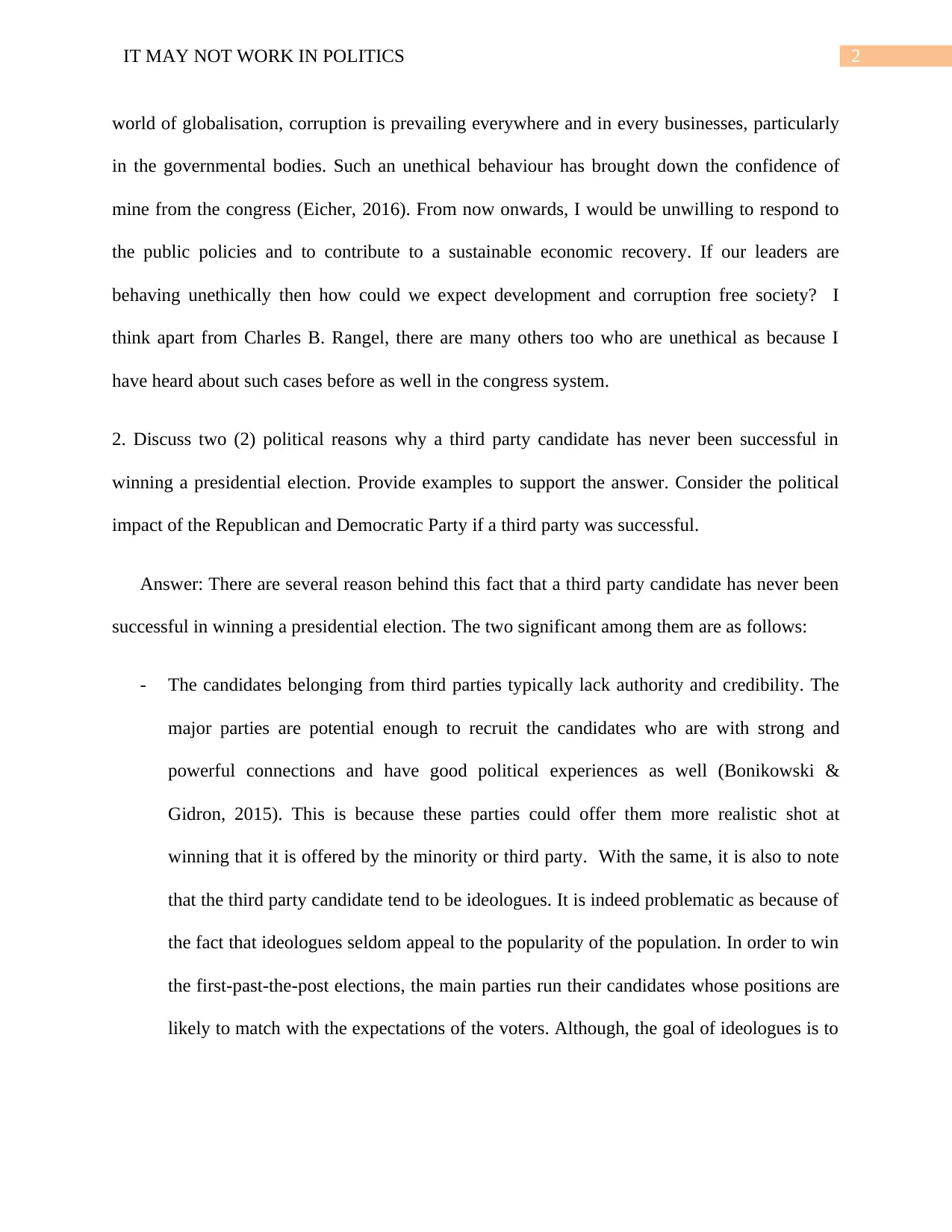
2IT MAY NOT WORK IN POLITICS
world of globalisation, corruption is prevailing everywhere and in every businesses, particularly
in the governmental bodies. Such an unethical behaviour has brought down the confidence of
mine from the congress (Eicher, 2016). From now onwards, I would be unwilling to respond to
the public policies and to contribute to a sustainable economic recovery. If our leaders are
behaving unethically then how could we expect development and corruption free society? I
think apart from Charles B. Rangel, there are many others too who are unethical as because I
have heard about such cases before as well in the congress system.
2. Discuss two (2) political reasons why a third party candidate has never been successful in
winning a presidential election. Provide examples to support the answer. Consider the political
impact of the Republican and Democratic Party if a third party was successful.
Answer: There are several reason behind this fact that a third party candidate has never been
successful in winning a presidential election. The two significant among them are as follows:
- The candidates belonging from third parties typically lack authority and credibility. The
major parties are potential enough to recruit the candidates who are with strong and
powerful connections and have good political experiences as well (Bonikowski &
Gidron, 2015). This is because these parties could offer them more realistic shot at
winning that it is offered by the minority or third party. With the same, it is also to note
that the third party candidate tend to be ideologues. It is indeed problematic as because of
the fact that ideologues seldom appeal to the popularity of the population. In order to win
the first-past-the-post elections, the main parties run their candidates whose positions are
likely to match with the expectations of the voters. Although, the goal of ideologues is to
world of globalisation, corruption is prevailing everywhere and in every businesses, particularly
in the governmental bodies. Such an unethical behaviour has brought down the confidence of
mine from the congress (Eicher, 2016). From now onwards, I would be unwilling to respond to
the public policies and to contribute to a sustainable economic recovery. If our leaders are
behaving unethically then how could we expect development and corruption free society? I
think apart from Charles B. Rangel, there are many others too who are unethical as because I
have heard about such cases before as well in the congress system.
2. Discuss two (2) political reasons why a third party candidate has never been successful in
winning a presidential election. Provide examples to support the answer. Consider the political
impact of the Republican and Democratic Party if a third party was successful.
Answer: There are several reason behind this fact that a third party candidate has never been
successful in winning a presidential election. The two significant among them are as follows:
- The candidates belonging from third parties typically lack authority and credibility. The
major parties are potential enough to recruit the candidates who are with strong and
powerful connections and have good political experiences as well (Bonikowski &
Gidron, 2015). This is because these parties could offer them more realistic shot at
winning that it is offered by the minority or third party. With the same, it is also to note
that the third party candidate tend to be ideologues. It is indeed problematic as because of
the fact that ideologues seldom appeal to the popularity of the population. In order to win
the first-past-the-post elections, the main parties run their candidates whose positions are
likely to match with the expectations of the voters. Although, the goal of ideologues is to
⊘ This is a preview!⊘
Do you want full access?
Subscribe today to unlock all pages.

Trusted by 1+ million students worldwide
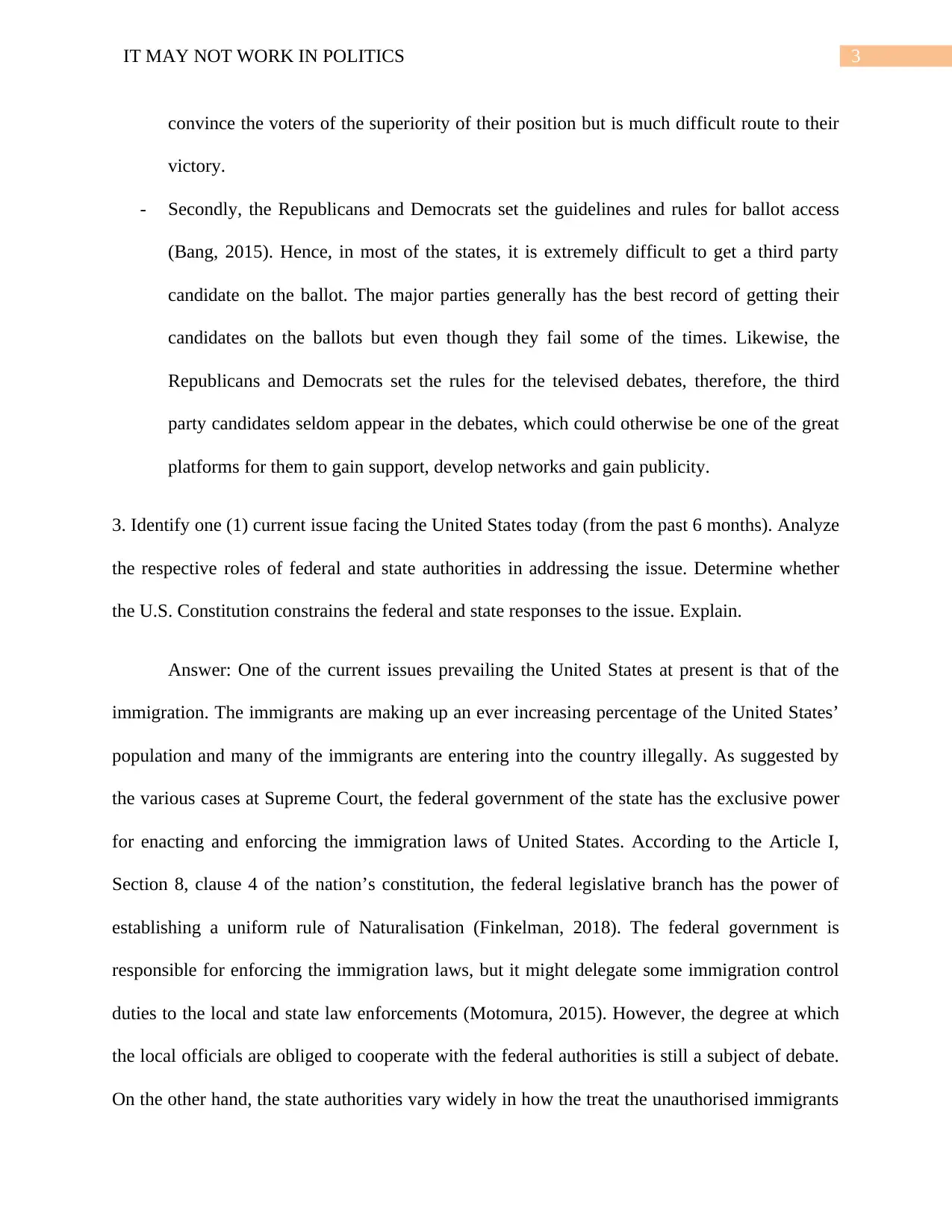
3IT MAY NOT WORK IN POLITICS
convince the voters of the superiority of their position but is much difficult route to their
victory.
- Secondly, the Republicans and Democrats set the guidelines and rules for ballot access
(Bang, 2015). Hence, in most of the states, it is extremely difficult to get a third party
candidate on the ballot. The major parties generally has the best record of getting their
candidates on the ballots but even though they fail some of the times. Likewise, the
Republicans and Democrats set the rules for the televised debates, therefore, the third
party candidates seldom appear in the debates, which could otherwise be one of the great
platforms for them to gain support, develop networks and gain publicity.
3. Identify one (1) current issue facing the United States today (from the past 6 months). Analyze
the respective roles of federal and state authorities in addressing the issue. Determine whether
the U.S. Constitution constrains the federal and state responses to the issue. Explain.
Answer: One of the current issues prevailing the United States at present is that of the
immigration. The immigrants are making up an ever increasing percentage of the United States’
population and many of the immigrants are entering into the country illegally. As suggested by
the various cases at Supreme Court, the federal government of the state has the exclusive power
for enacting and enforcing the immigration laws of United States. According to the Article I,
Section 8, clause 4 of the nation’s constitution, the federal legislative branch has the power of
establishing a uniform rule of Naturalisation (Finkelman, 2018). The federal government is
responsible for enforcing the immigration laws, but it might delegate some immigration control
duties to the local and state law enforcements (Motomura, 2015). However, the degree at which
the local officials are obliged to cooperate with the federal authorities is still a subject of debate.
On the other hand, the state authorities vary widely in how the treat the unauthorised immigrants
convince the voters of the superiority of their position but is much difficult route to their
victory.
- Secondly, the Republicans and Democrats set the guidelines and rules for ballot access
(Bang, 2015). Hence, in most of the states, it is extremely difficult to get a third party
candidate on the ballot. The major parties generally has the best record of getting their
candidates on the ballots but even though they fail some of the times. Likewise, the
Republicans and Democrats set the rules for the televised debates, therefore, the third
party candidates seldom appear in the debates, which could otherwise be one of the great
platforms for them to gain support, develop networks and gain publicity.
3. Identify one (1) current issue facing the United States today (from the past 6 months). Analyze
the respective roles of federal and state authorities in addressing the issue. Determine whether
the U.S. Constitution constrains the federal and state responses to the issue. Explain.
Answer: One of the current issues prevailing the United States at present is that of the
immigration. The immigrants are making up an ever increasing percentage of the United States’
population and many of the immigrants are entering into the country illegally. As suggested by
the various cases at Supreme Court, the federal government of the state has the exclusive power
for enacting and enforcing the immigration laws of United States. According to the Article I,
Section 8, clause 4 of the nation’s constitution, the federal legislative branch has the power of
establishing a uniform rule of Naturalisation (Finkelman, 2018). The federal government is
responsible for enforcing the immigration laws, but it might delegate some immigration control
duties to the local and state law enforcements (Motomura, 2015). However, the degree at which
the local officials are obliged to cooperate with the federal authorities is still a subject of debate.
On the other hand, the state authorities vary widely in how the treat the unauthorised immigrants
Paraphrase This Document
Need a fresh take? Get an instant paraphrase of this document with our AI Paraphraser
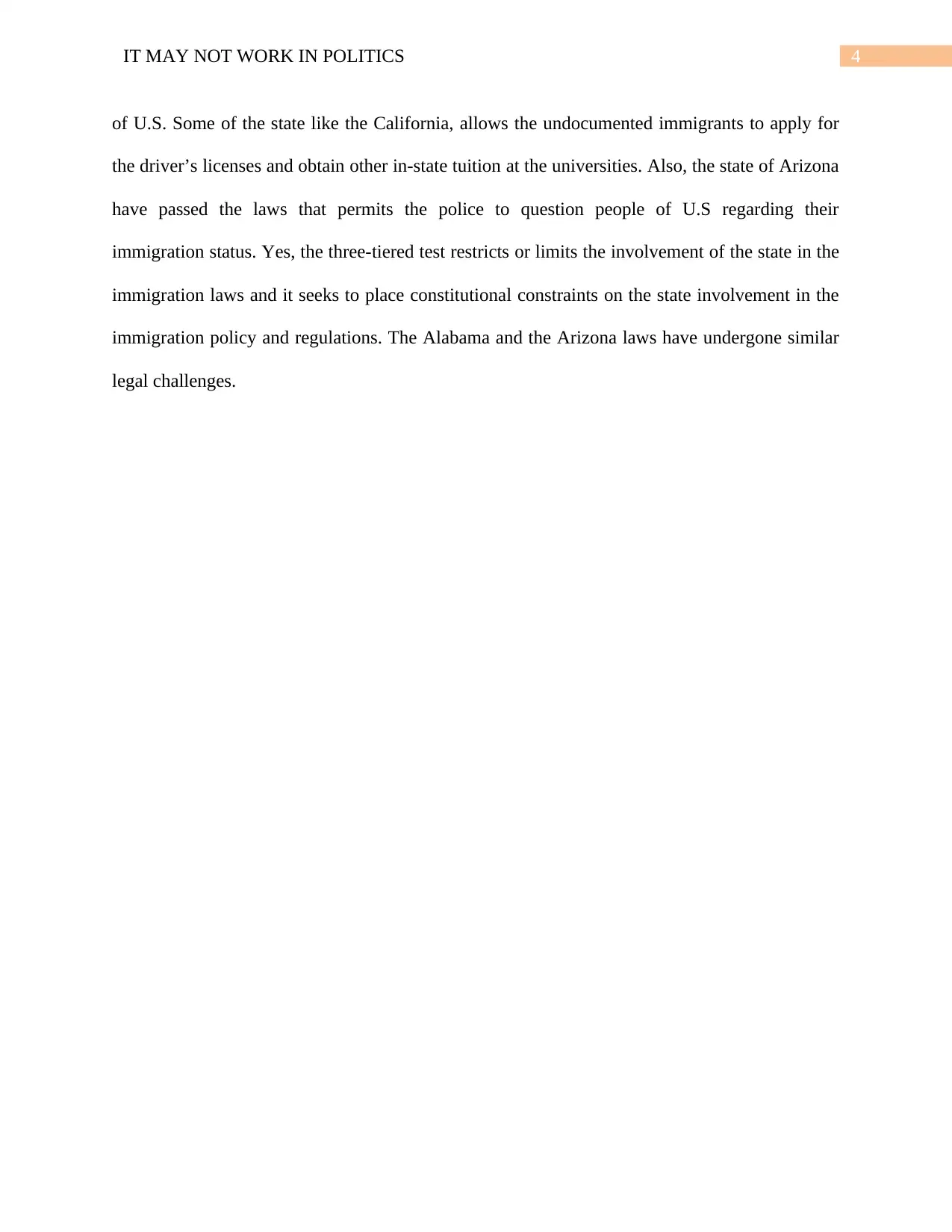
4IT MAY NOT WORK IN POLITICS
of U.S. Some of the state like the California, allows the undocumented immigrants to apply for
the driver’s licenses and obtain other in-state tuition at the universities. Also, the state of Arizona
have passed the laws that permits the police to question people of U.S regarding their
immigration status. Yes, the three-tiered test restricts or limits the involvement of the state in the
immigration laws and it seeks to place constitutional constraints on the state involvement in the
immigration policy and regulations. The Alabama and the Arizona laws have undergone similar
legal challenges.
of U.S. Some of the state like the California, allows the undocumented immigrants to apply for
the driver’s licenses and obtain other in-state tuition at the universities. Also, the state of Arizona
have passed the laws that permits the police to question people of U.S regarding their
immigration status. Yes, the three-tiered test restricts or limits the involvement of the state in the
immigration laws and it seeks to place constitutional constraints on the state involvement in the
immigration policy and regulations. The Alabama and the Arizona laws have undergone similar
legal challenges.
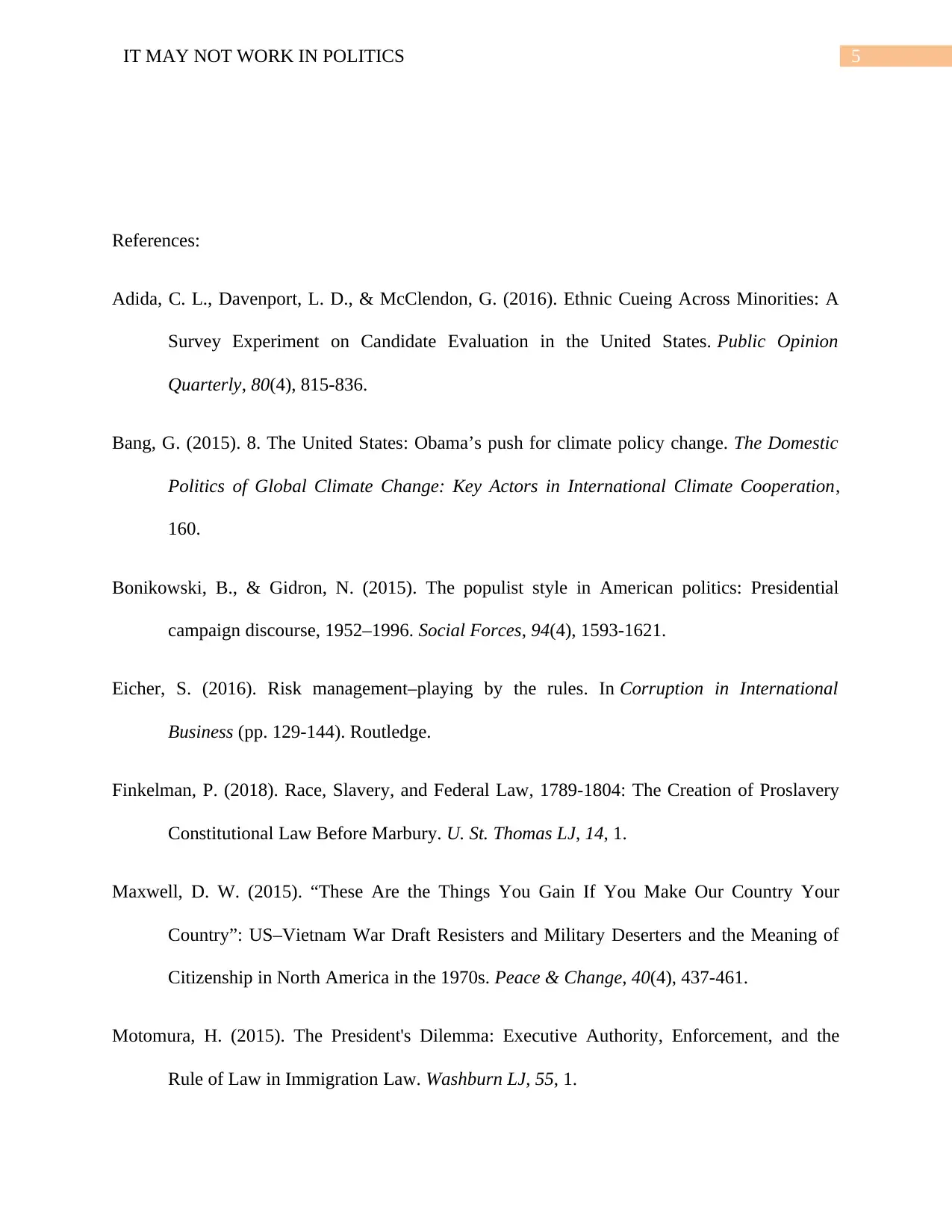
5IT MAY NOT WORK IN POLITICS
References:
Adida, C. L., Davenport, L. D., & McClendon, G. (2016). Ethnic Cueing Across Minorities: A
Survey Experiment on Candidate Evaluation in the United States. Public Opinion
Quarterly, 80(4), 815-836.
Bang, G. (2015). 8. The United States: Obama’s push for climate policy change. The Domestic
Politics of Global Climate Change: Key Actors in International Climate Cooperation,
160.
Bonikowski, B., & Gidron, N. (2015). The populist style in American politics: Presidential
campaign discourse, 1952–1996. Social Forces, 94(4), 1593-1621.
Eicher, S. (2016). Risk management–playing by the rules. In Corruption in International
Business (pp. 129-144). Routledge.
Finkelman, P. (2018). Race, Slavery, and Federal Law, 1789-1804: The Creation of Proslavery
Constitutional Law Before Marbury. U. St. Thomas LJ, 14, 1.
Maxwell, D. W. (2015). “These Are the Things You Gain If You Make Our Country Your
Country”: US–Vietnam War Draft Resisters and Military Deserters and the Meaning of
Citizenship in North America in the 1970s. Peace & Change, 40(4), 437-461.
Motomura, H. (2015). The President's Dilemma: Executive Authority, Enforcement, and the
Rule of Law in Immigration Law. Washburn LJ, 55, 1.
References:
Adida, C. L., Davenport, L. D., & McClendon, G. (2016). Ethnic Cueing Across Minorities: A
Survey Experiment on Candidate Evaluation in the United States. Public Opinion
Quarterly, 80(4), 815-836.
Bang, G. (2015). 8. The United States: Obama’s push for climate policy change. The Domestic
Politics of Global Climate Change: Key Actors in International Climate Cooperation,
160.
Bonikowski, B., & Gidron, N. (2015). The populist style in American politics: Presidential
campaign discourse, 1952–1996. Social Forces, 94(4), 1593-1621.
Eicher, S. (2016). Risk management–playing by the rules. In Corruption in International
Business (pp. 129-144). Routledge.
Finkelman, P. (2018). Race, Slavery, and Federal Law, 1789-1804: The Creation of Proslavery
Constitutional Law Before Marbury. U. St. Thomas LJ, 14, 1.
Maxwell, D. W. (2015). “These Are the Things You Gain If You Make Our Country Your
Country”: US–Vietnam War Draft Resisters and Military Deserters and the Meaning of
Citizenship in North America in the 1970s. Peace & Change, 40(4), 437-461.
Motomura, H. (2015). The President's Dilemma: Executive Authority, Enforcement, and the
Rule of Law in Immigration Law. Washburn LJ, 55, 1.
⊘ This is a preview!⊘
Do you want full access?
Subscribe today to unlock all pages.

Trusted by 1+ million students worldwide
1 out of 6
Your All-in-One AI-Powered Toolkit for Academic Success.
+13062052269
info@desklib.com
Available 24*7 on WhatsApp / Email
![[object Object]](/_next/static/media/star-bottom.7253800d.svg)
Unlock your academic potential
Copyright © 2020–2025 A2Z Services. All Rights Reserved. Developed and managed by ZUCOL.